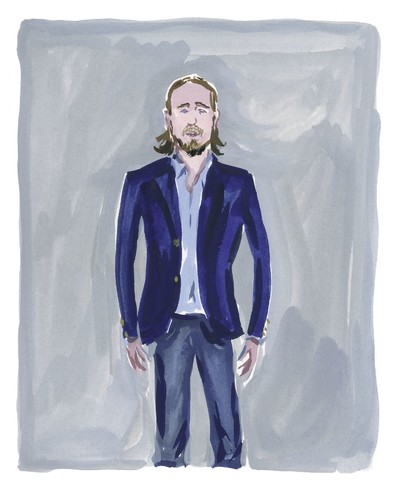The underwear manufacturer tackling third-world ‘period poverty’.
By Dominic McVey
Illustration by Jean-Philippe Delhomme
The underwear manufacturer tackling third-world ‘period poverty’.

The period panty project started back in 2013, when I invested in Hela, a Sri Lankan clothing manufacturer. It took proper shape in 2016 when we opened factories for Hela Intimates in Kenya and Ethiopia, where we produce underwear for brands like Calvin Klein and Tommy Hilfiger. In all our factories, we practise sustainable manufacturing that reflects our company’s ethos: we provide our employees with meals, accommodation and transport, as well as training that provides transferable skills in machine operation and management, allowing our employees to earn a living wage.
Yet, despite our efforts, I noticed that women of many different ages were lacking help with one hugely important aspect of their lives: their periods. Still a massive taboo in Sri Lanka, Kenya and Ethiopia, periods are considered impure by many communities resulting in millions of women being excluded from social situations, including work and education. In sub-Saharan Africa, 1 in 10 girls will either miss school or drop out entirely due to their period; according to some estimates, they miss 20% of a given school year. In Kenya, 66% of girls cannot afford to buy sanitary products. A staggering 95% of girls in rural Ghana report missing school during their periods, and worldwide, 113 million adolescent girls are at risk of dropping out due to their period. Some girls are given reusable period pads by NGOs, but underwear is needed to hold these in place, which in some cases, is too expensive. So to deal with their periods, millions of women around the world are forced to use non-absorbent pieces of cloth that are unsanitary, leak and cause them embarrassment and shame.
I have seen empty chairs in our offices or on our factory floors because a woman did not come in due to her period. I have seen women running across the canteen with blood where they were stood or sat. I have known our toilets to be occupied for hours or the drains to be clogged by the cloth women have used to absorb the flow and then thrown away. I can only imagine the hardship and mental stress a woman must go through due to lack of community support, education or access to the right products.
So I decided to work on a solution. From the beginning, I was convinced that the answer was not giving sanitary pads to women. Sanitary pads are a modern solution that is actually outdated, a disposable, environmentally unfriendly product developed by an industry that needs to encourage mass consumption. Products are also developed with Western habits and sanitary situations in mind, far removed from what is required in a rural village in Kenya. What was needed was an alternative that would be cheaper, genuinely reusable, and perfectly discreet.
With assistance from my colleague Buddhi Paranamara at Hela Clothing and with input from Parsons School of Design, we developed a reusable women’s panty that can be used as a normal panty and then during menstrual cycles with a heavy flow, or for fistula or urinary incontinence. The panty uses special technology in the lining that makes it super absorbent yet ultra-thin, and stops any chance of leakage. And as it’s reusable, it’s more environmentally friendly for the planet and more cost-effective for women. We also used our collective experience in garment design and manufacturing to create a panty that, perhaps most importantly, looks just like normal underwear to the eye and touch. Which means women can wash it and hang it out like any other garment, without alerting everyone that they may be on their period. So far, we’ve produced several thousand period panties, of which we have donated a large number to women in refugee camps across Asia and Africa. With our partners, we hope that we can continue helping women across the world, making their lives easier and in the process helping bring an end to period poverty.